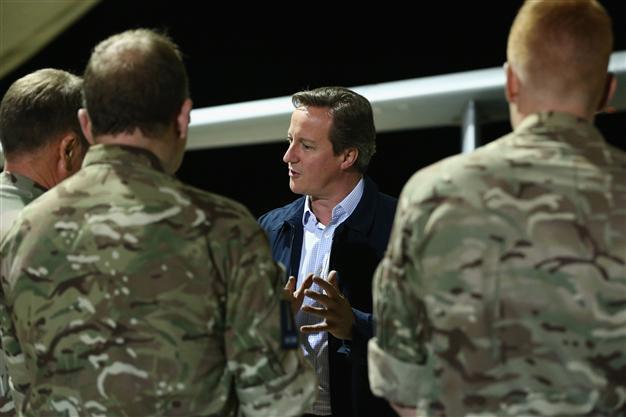British PM first leader to visit new Afghan president Ghani
KABUL, Afghanistan - Agence France-Presse

British Prime Minister David Cameron meets pilots, engineers and logistic support staff in front of a Tornado GR4 at RAF Akrotiri base, Cyprus, Thursday, Oct. 2, 2014. AP Photo
British Prime Minister David Cameron on Oct. 3 became the first world leader to hold talks with newly-inaugurated Afghan President Ashraf Ghani, as NATO troops end their long war against the Taliban.
Cameron arrived in Kabul on the unannounced visit after visiting an air base in Cyprus, where British jets launching strikes against Islamic State militants in Iraq are based.
Ghani was sworn in on Monday after a fraud-tainted election that plunged Afghanistan into months of political deadlock.
In a US-brokered deal, Ghani signed a power-sharing agreement with his former poll rival Abdullah Abdullah, who was appointed to the new position of "chief executive".
The stability of the new "national unity government" is seen as essential for Afghanistan's future as the international military presence and aid funding declines.
The presidential palace in Kabul and British officials confirmed that the visit had started, and talks were under way.
The British army has wound down its presence in the volatile southern Afghan province of Helmand after years of heavy fighting in some areas where the Taliban has launched fresh offensives in recent weeks.
Britain still has 3,900 troops in the country as part of the NATO's International Security Assistance Force (ISAF), most of them at Camp Bastion in Kandahar province.
ISAF will complete its combat mission at the end of this year, with a follow-up "support" mission taking over in 2015 on training duties, assisting the Afghan army and police.
The British contribution to the follow-up mission will be at an army officers' training academy outside Kabul.
On Tuesday, his first full day in office, Ghani signed separate agreements with the US and NATO permitting foreign troops to stay in the country into next year.
The agreements had been delayed for more than a year as then-president Hamid Karzai refused to sign them despite domestic and international pressure.
The new US-led mission, which will take over on January 1, will be made up of 9,800 US troops and about 3,000 soldiers from other coalition member nations.
Named Resolute Support, it will focus on supporting the 350,000 strong local security forces as they take on the Taliban, in parallel with US counter-terrorism operations.
Afghan casualties have rocketed over the past two years as NATO has scaled back and handed over most combat duties to the Afghan police and army.
General John Campbell, who recently took over as head of ISAF, said Thursday that 7,000 to 9,000 Afghan soldiers and police had been killed or wounded already in 2014.
With the Taliban launching new offensives, NATO support next year is seen as crucial -- though the limited size of the mission and the fact that it will be reduced during 2015 will restrict its capabilities.
The failure to sign a similar troop deal with Iraq in 2011 led to a complete withdrawal of US troops from the country, which is now engulfed in Islamist violence.
Ghani's inauguration marked Afghanistan's first democratic transfer of power, although the UN said the election was beset by "significant fraud".
Since 2001, 453 British personnel have been killed during military operations in Afghanistan, according to ministry of defence figures.
